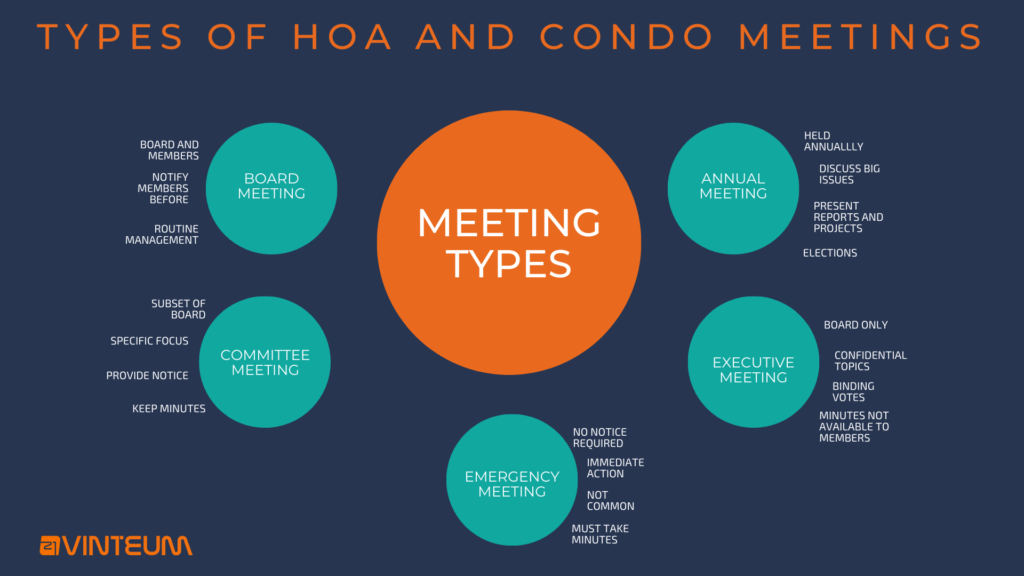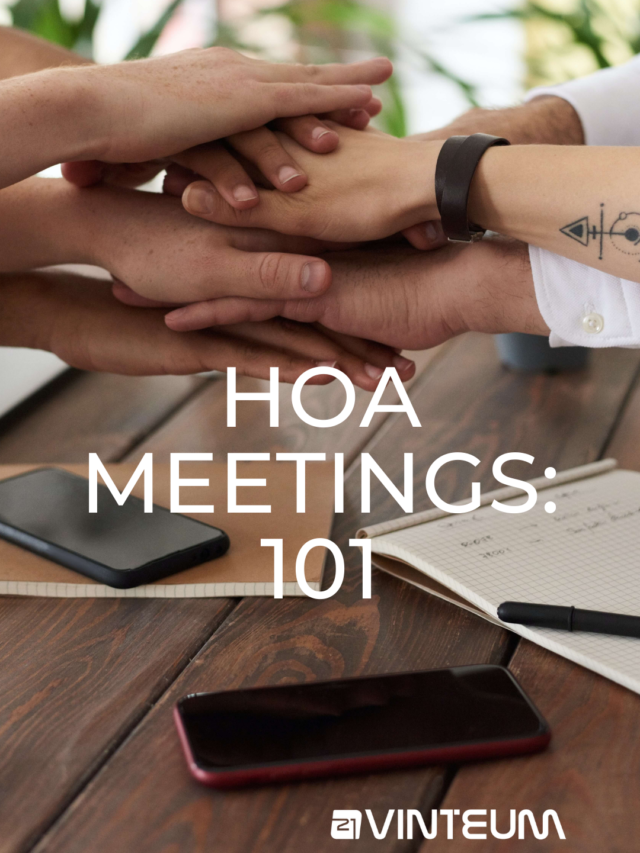Preparing an HOA meeting that engages community members is one of the main activities of an HOA board of directors. Different types of HOA meetings exist and each one of them has specific rules. And preparing and running an HOA meeting efficiently is not a straightforward task. So find out everything you need to know.
HOA meetings run smoother when everyone is informed and involved — and Neigbrs by Vinteum makes that easy. Share agendas, meeting minutes, and reminders in a central portal that residents can access anytime, from any device.
Keep your community in the loop, encourage participation, and simplify board operations — all in one place.
📢 Request your free demo today!

What is an HOA Meeting?
An HOA meeting is a gathering where residents and HOA board members discuss community-related topics. The board is required to prepare and hold them. There are different types of HOA meetings and each one serves a different purpose. A lot of different topics are covered during such encounters, such as:
-
- Maintenance and renovation projects
-
- Disputes among residents
-
- Amenities and facilities usage
-
- Emergencies and disasters
-
- Community events
Types of meetings
There are five types of HOA Meetings, which are also held in condos. It’s important to know what they all are so that you can plan for each one. Each meeting is governed by rules depending on your state laws and your community association’s governing documents.

Board of Directors Meeting
The board of directors (or board) meeting is the most common type of meeting in a homeowners association (HOA).
Participants:
The board of directors is required to participate. Members of the HOA are encouraged to attend as well.
Frequency:
Depending on the size of the community, and what needs to be addressed, these meetings can be every month or quarter.
Procedure:
The board needs to notify members that there is going to be a board meeting. When you need to notify them depends on the state and governing documents, but often it’s 7-30 days before the meeting.
The notice should include the agenda of everything that will be discussed. Unless there is an open forum, nothing outside of the agenda is talked about.
During the meeting, a board member (often the secretary) must take minutes.
Topics:
At board meetings, routine management is discussed.
Such as:
-
- Maintenance and renovation projects
-
- Disputes among residents
-
- Amenities and facilities usage
-
- Emergencies and disasters
-
- Community events

Annual Meeting
The biggest type of meeting your community association holds is an Annual Meeting or Annual General Meeting.
Participants:
It’s open to all members of the HOA and the board of directors.
Frequency:
As the name suggests it is held every year.
Procedure:
You must send out a notice before the meeting in accordance with state laws and your HOA’s governing documents. Often, you need to send it earlier than for a normal HOA Board meeting.
Topics:
As it’s the biggest meeting, the community talks about the big projects, the annual budget and elects new board members.

Executive Meeting
The most private and privileged of HOA Board meetings is an executive meeting.
Participants:
Only board members are allowed to attend executive meetings.
Frequency:
An executive session happens when the board needs to talk about confidential or sensitive information.
Procedure:
Normally they’re held after a normal board meeting, however, they can be held separately. Also, a vote can happen if it’s necessary. Finally, executive meeting minutes aren’t made public, since they are sensitive. It is a good idea to make a note that an executive meeting happened, especially if it’s after a normal meeting.
Topics:
The topics at executive board meetings are always sensitive information. For instance, litigation issues with your attorney, or delinquent assessments. Another topic might be any problems with staff.
Committee Meeting
If your HOA is larger it may have committees that help manage different parts of the community association.
Participants:
The committee members need to attend. Then your state laws and executive documents will decide if they’re open or closed to HOA members. If they’re open doors the committee normally provides the same amount of notice as a board meeting so that HOA members can come too.
Frequency:
This will depend on the type of HOA committee. You can have standing committees (e.g. architectural review, landscaping, newsletter committees) or special committees (for a specific issue for a set period of time).
Procedure:
An agenda should be set, and minutes need to be taken. If they’re open to HOA members, then you should send out a meeting notice in accordance with state law and your governing documents.

Topics:
This depends on the committees.
-
- An Architectural Review Committee (ARC) will go through the forms they have received and discuss whether they can approve the projects or not.
-
- A Landscaping Committee researches landscaping companies and interviews them. Once they have a service provider they oversee their work and let the board know what’s going on.
-
- A Newsletter Committee needs to meet to decide what is going on in the newsletter in that month or quarter and discuss how to distribute it.
-
- A Budget Committee is in charge of the annual budget. There may also be an insurance or reserves sub-committee.
There are also other committees such as a social committee, a welcoming committee, or a safety committee which would all need to meet monthly or quarterly to discuss relevant topics.
Emergency Meeting
The rarest and most worrying meetings are emergency or special meetings.
Participants:
The board of directors, their manager, and possibly homeowners.
Frequency:
Since it’s an emergency meeting, very rarely (hopefully). There is no set schedule, and some community associations may never hold one.
Procedure:
Since it’s an emergency they may be held virtually or over the phone. There won’t normally be an agenda, since the topic will be clear. Taking minutes is important so that you have a record and you can share them with residents if necessary. However, you should follow your governing documents and see what they say about emergency meetings.
Topics:
The only topic will be the emergency. This could be a wildfire near the community or a global pandemic. The board holds a special meeting to decide what action they’re going to take.
How to Prepare for an HOA Meeting
Know the rules around HOA meetings
Homeowners associations have a lot of rules and procedures. So it comes as no surprise that the same applies to any HOA meeting. Before starting to prepare for it make sure to review your governing documents. Also, give a quick look at your HOA state law. This serves as a protection to you and your community. Compliancy should never be neglected. Otherwise, lawsuits, complaints, and violations will frequently occur.
Notice of meeting requirements
According to law, HOA meetings must be notified to all community members in advance. This is the case for practically all types of meetings unless it is an emergency or executive one. The notification is sent days or weeks before the event. The number of days varies from an HOA to another. It also depends on the state. In general, it is 4 to 30 days before the meeting.
Another thing to consider is the HOA election timeline. HOA elections happen during annual meetings. They require a specific timeline for notices. Again, this will vary depending on the state. For example, the Florida HOA election timeline is different from the California HOA election timeline.

HOA Meeting Agenda
Most gatherings require a meeting agenda to be sent before the encounter along with the meeting notice. A meeting agenda should include all the topics that the board members will discuss. It can also include an “open forum” line so that residents can come prepared with questions.
Communicate efficiently and effectively
What makes a meeting successful is good preparation and communication. It is easy to master meeting preparation. But if you don’t communicate it well, chances are that only a few people will come. This can be detrimental to an effective session. Some decisions require a minimum rate of participation to be valid. Besides, a meeting is crucial to pass on essential information. So having a low participation rate is probably going to increase the number of uninformed members.
If this continues, members will become frustrated and angry that they don’t know what is going on. A good way to fix that is to make sure you send meeting notices through different channels. You need to make sure that all homeowners are receiving the information. Imagine if you only send the notice via email and some residents don’t even have an email address. Using different communication channels allows you to reach a larger number of homeowners and increase the participation rate.
How NOT to conduct a board meeting
Sometimes it is better to learn the hard way. Many board members have had unsuccessful meetings because of some bad habits. As a result, residents complain and board members are outvoted. However, these situations can teach valuable lessons. So in this next section, we will share a few tips on how NOT to conduct a board meeting
Not preparing a meeting agenda
Without an HOA meeting agenda, you can rest assured that your meeting will lead to an unfruitful session. It will probably just be a lot of empty talks and complaints. Besides, you will probably:
-
- Forget to mention important information
-
- Struggle to make clear decisions
-
- Lose control of the meeting and it will go off-topic
Another wrong practice is not sticking to what is on the agenda. This makes the HOA agenda useless. It can also be very frustrating to members who want to know about a specific topic.
Lack of HOA board meeting etiquette
HOA board members are volunteers, it is not their actual profession. That is why HOA meetings are not expected to be highly formal business meetings. That is fine, it may even help the meeting to be more inclusive. However, this doesn’t mean that professionalism is not required. Board members should be well-prepared before the meeting. They should stick to the agenda time, they should be comfortable talking in front of the audience. Also, They should be dressed appropriately. Most importantly they need to patiently consider residents’ complaints and concerns. Another important aspect is mutual respect. Board members should be able to respond respectfully to residents’ questions. On the other side, residents should respect the board of directors as fellow residents and as the governing body of their association.
Inviting outsiders without notice
There are different laws regarding who can attend a board meeting and who cannot. Again, refer to your governing documents and check what is stated. Some communities allow renters or seasonal residents to attend some meetings. Others allow them only to attend, not to participate in discussions. Residents should ask the board before bringing external individuals such as a girlfriend, a relative, or a contractor. The board should also notify the residents if a partner such as a lawyer or a community manager will attend.
Wrapping up
An HOA meeting is the foundation of a well-run community. When done correctly, important discussions happen, votes take place and decisions are made quickly. These encounters also help resolve disputes among residents. But most importantly, they help strengthen community ties and resolve issues.




10 Responses
This is very helpful information but I am wondering what are the requirements for following the 719 Statutes as we are a Florida Cooperative community.
Thanks for your comment! An HOA attorney is better suited to answer this question.
Hi Norvello Garden HOA in Port Elizabeth South Africa do have 7 members or EXCOM members .,one of the members is very negative and don’t give his support to the committee and bring the committee is bad light . He don’t participate in any thing . if he post some points it will be negative to the new committee. confidential information he post on media platforms . question how do we get this member out , the long way is to declare a dispute with him and go to CSOS . that is going to take long .Our constitution is not good and was written 13 year back by developer don’t have any legal leg to stand on . I am the new Chairman of this EXCOM . We need legal help to get him out and place a person their that want to help the complex to go forward . Their was 7 name nominated and it was the new committee , he did not vote for the new chairman and deputy .
A meeting is coming up and he is going to disrupt it with his negative comment . Can i suspend him from the meeting pending a ruling from CSOS .
Any help will assit us .
thanks for reading my mail
Hi there,
Thanks for your comment! I’m not sure. I think it would be best to check with an attorney.